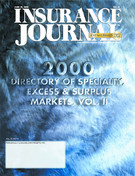The Internet can stand up and take a bow. It just received a hearty endorsement in the form of the unanimous Senate passage on June 15 of S. 761, “Electronic Signatures in Global and National Commerce Act.”
Passage of the act indicates that we are ready to accept the value of the Internet; to recognize it as a trustworthy business tool. More than just eliminating one more piece of paper on your desk, S. 761 gives electronic signatures and records the same legal weight as written signatures and records, allowing entire business transactions to take place on the Internet and to hold up in court.
This legal validity creates “the kind of certainty that insurance companies like to deal with,” said Robyn Rowen, NAII senior counsel in Washington, D.C. “That kind of environment makes us very comfortable.”
The former system must have created some distinctly uncomfortable moments for insurers. Rowen describes it as “a patchwork of different types of digital and electronic signature laws across the country [that] has made it difficult to conduct business nationwide.”
Consistency is key. Although more than a dozen states have adopted some form of e-signature legislation, state laws—such as California’s—that do not follow the Uniform Electronic Signature Act (UETA) could be pre-empted by the new federal law.
Passage of the act is likely to intensify rivalry in the already competitive marketplace. If your competitor down the street is quoting, binding and signing all her paperwork online with her customers while you’re struggling to apply band-aids to your paper-cuts, guess who has the advantage?
If consumers want to live online in the 21st Century, why drag them back to the 20th Century with the requirement of a handwritten signature? That single piece of paper in the transaction puts a major speed bump in the fast lane of the information super highway.
The trust issue is one reason for the speed bump. Is an e-contract as good as a written contract? Does it make the coverage any less bound or the policyholder any less secure?
“People have a hard time trusting something new,” Rowen mused. “[They think] it can’t be as reliable as the good old mail, the good old wet signature…but the trust will never grow if there’s no legal validity.”
Bob Sherer of In-Focus in Thousand Oaks, Calif., remembers a time not too long ago when Xerox copies were not acceptable as signatures. “The signature had to be handwritten—they were afraid that someplace overnight in the Library of Congress it would just disappear, the toner would disappear or something.”
Of course, for the electronically cautious, there is always the option to do it the old-fashioned way. It’s not written in stone (or in HTML) that you must use the electronic method. Just like the use of cash vs. credit cards, cash usually works just fine.
Having accepted its due praise for coming this far, the Internet must sit down and wait for the crowning achievement: the Presidential signature—in pen and ink.
Was this article valuable?
Here are more articles you may enjoy.


 After Falling 6% in 2025, Average Auto Insurance Cost Will Stabilize in 2026, Says Insurify
After Falling 6% in 2025, Average Auto Insurance Cost Will Stabilize in 2026, Says Insurify  Data Center Boom Offers Organic Growth Opportunities for Brokers Like Aon, Marsh
Data Center Boom Offers Organic Growth Opportunities for Brokers Like Aon, Marsh  MAPFRE Denied Injunction Against AAA Auto Insurance Sales in Massachusetts
MAPFRE Denied Injunction Against AAA Auto Insurance Sales in Massachusetts  What Analysts Are Saying About the 2026 P/C Insurance Market
What Analysts Are Saying About the 2026 P/C Insurance Market 


